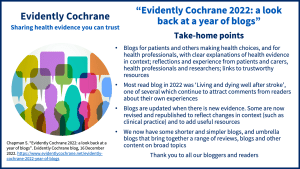In the final Evidently Cochrane blog of the year, Sarah Chapman from Cochrane UK takes a look back at some highlights and changes from 2022.
Take-home points
A blog that has touched many
Our most read blog this year was Living and dying well after stroke by Scott Murray and Marilyn Kendall. Ever since it was published in 2018, a steady flow of readers has shared in the comments their experiences of someone close to them having a major stroke. Researchers Scott and Marilyn have written about the rich evidence from in-depth interviews, which could guide person-centred care after major stroke and support people in living and dying well. In this, and in the comments, we trust people will continue to find important insights and – for those supporting loved ones – something that will help them feel less alone in their situation.
This blog was one of five that have attracted an unusual number of comments and which we explored (last year) with the help of qualitative researcher Fran Toye, to understand what readers get from our blogs, and how we might better serve them. If you missed it, you can catch up with that in Experiencing Evidently Cochrane blogs: uncertainty, suffering and solidarity. All five blogs continue to be among our most read.
COVID-19, the continuing story
We’re into our third winter with COVID-19 and we’re keeping up with the growing, changing, evidence base here on Evidently Cochrane. Most recently we have had blogs on vaccines, addressing the question, Are COVID-19 vaccines effective and safe? and on COVID tests: how accurate are LFTs? As well as blogs on specific aspects of prevention or treatmentSomething done with the aim of improving health or relieving suffering. For example, medicines, surgery, psychological and physical therapies, diet and exercise changes., we have three covering multiple reviews and related content (such as Cochrane Clinical Answers): COVID-19 evidence: a Cochrane round-up; Treatments for mild COVID-19: Cochrane evidence; Treatments for moderate-to-severe COVID-19: Cochrane evidence.
Like all our blogs, these are updated when new evidence is available. But now there’s more…
Upcycled blogs
If upcycling is adding value to something that might otherwise be thrown away, then I think we can say we’re upcycling many of our older blogs. We’re now going further than ‘just’ updating them when new Cochrane evidenceCochrane Reviews are systematic reviews. In systematic reviews we search for and summarize studies that answer a specific research question (e.g. is paracetamol effective and safe for treating back pain?). The studies are identified, assessed, and summarized by using a systematic and predefined approach. They inform recommendations for healthcare and research. is available. Where the context has changed, practice has moved on, and perhaps there are useful resources to add, we are reflecting this in revised and republished blogs. We’re also bringing them into line with current house style and ensuring they meet accessibility standards. We want all our content to be current and useful, so we are working our way through all the blogs to see what can be upcycled in this way and what needs to be archived.
Among several blogs we’ve done this with in 2022 is Lynda Ware’s blog Wrist fractures in children: how are they best treated? to which we were able to add the results of FORCE, a large multicentre studyA trial conducted at several geographical sites. Trials are sometimes conducted among several collaborating institutions, rather than at a single institution - particularly when very large numbers of participants are needed. in progress when Lynda was writing this in 2019. This is one of our most popular blogs this year.
New on the blog: some shorter, simpler blogs
This year we have introduced a new, short format blog to act as a “quick look” at evidence for decision making and to point to helpful resources. All our blogs aim to be written in plain language, but these are further simplified, and some are published alongside a longer version. The first short blog was published in June 2022 on cataract surgery for people needing surgery on both eyes – Cataract surgery: a quick look. This was published with a longer version, Cataract surgery: both eyes on the same day or on different days?. We’re pleased to have heard from several people that it has helped inform their decisions about cataract surgery.
Umbrella blogs
We’ve always had blogs which bring together evidence from multiple reviews on a topic, but we’ve expanded this. In keeping with our move to provide links to useful resources in the blogs, where possible, we’ve started doing some broad topic blogs that bring together a wealth of content, including blogs, Cochrane reviewsCochrane Reviews are systematic reviews. In systematic reviews we search for and summarize studies that answer a specific research question (e.g. is paracetamol effective and safe for treating back pain?). The studies are identified, assessed, and summarized by using a systematic and predefined approach. They inform recommendations for healthcare and research., resources (such as clinical guidelines, NHS pages, and links to relevant charities and support groups) and research opportunities. For example, our blog Dementia: evidence, experience and resources.
We have retired our regular round-up blogs on Evidence for Maternity Care/Nursing/Allied Health, but there is plenty still on Evidently Cochrane for healthcare professionals and clinical support staff. We hope they will find something useful in all the blogs, but we also have some written for a health professional audience, such as Venous leg ulcers: evidence review.
Patients as partners in research
Many of our blogs include patient experience and we have had several this year that discuss their involvement in research. Audiologist Roulla Katiri and Lewis Williams, who developed single-sided deafness, wrote about their work on the CROSSSD studyAn investigation of a healthcare problem. There are different types of studies used to answer research questions, for example randomised controlled trials or observational studies., to develop a core outcomeOutcomes are measures of health (for example quality of life, pain, blood sugar levels) that can be used to assess the effectiveness and safety of a treatment or other intervention (for example a drug, surgery, or exercise). In research, the outcomes considered most important are ‘primary outcomes’ and those considered less important are ‘secondary outcomes’. set for trialsClinical trials are research studies involving people who use healthcare services. They often compare a new or different treatment with the best treatment currently available. This is to test whether the new or different treatment is safe, effective and any better than what is currently used. No matter how promising a new treatment may appear during tests in a laboratory, it must go through clinical trials before its benefits and risks can really be known. of treatments in Single-sided deafness: working together to improve research into treatments.
Researcher Aleena Wojcieszek and writer and new mum Jessica Hatcher-Moor blogged about their work on a new WHO guideline that focuses on Putting positive experiences at the centre of postnatal care.
Karen Morley, who wrote about her experiences of OCD (obsessive compulsive disorder) and how evidence helped her, back in 2018, has updated us on what happened next in My OCD journey: learning and compassion in tough times. Her blog makes for sobering reading about her experiences during the pandemic, but she also talks about how empowering her involvement in research has been and how she has come to be a more confident partner in making shared decisions about her health.
Annette Dancer, a stroke survivor, has written for us in the past about her involvement in research. We are pleased that she returned to the blog this year to share her experiences, alongside Dr James Garrard, in Giving information after stroke: what’s helpful?
Help with making health decisions
Providing trustworthy information to inform people’s health decisions is at the heart of our blogs, along with the reflections of patients and carers, clinicians and researchers, which help make it meaningful and add some vital real-life context. Lots of our blogs now also mention using the BRAIN tool to think through a health decision: What are the Benefits, Risks, Alternatives, what do I want and what if I do Nothing? These can be helpful questions to discuss with your doctor or other health professional too.
A quick reminder that we have blogs that focus on everyday health choices such as Salt substitutes vs. regular salt in your diet and on running shoes and [risk of] lower limb injuries.
Whatever health decisions you might be making, our blog Making health decisions: things that can help is packed with useful resources.
Looking ahead
It’s a time of enormous change in Cochrane so 2023, which is also our 30th anniversary year, will see more changes than usual, including the first reviews in a new format. You can read more in this Editorial, from our Editor in Chief Karla Soares-Weiser, Looking back, looking forward: Cochrane at 30 and beyond.
We’re anticipating the publication of a range of reviews that are important for different reasons, and we hope to have blogs on these to coincide with their publication. Do come back in January for the first (and maybe second!) of these.
Thank you
We are so grateful to everyone who has blogged for us this year and helped to make the evidence easier to understand and more meaningful for our audiences.
Also, thank you to our readers, whether you’re here for the first time or the umpteenth. See you again soon.
Join in the conversation on Twitter with @SarahChapman30 and @CochraneUK or leave a comment on the blog. Please note, we cannot give medical advice and we will not publish comments that link to commercial sites or appear to endorse commercial products. We welcome diverse views and encourage discussion. However we ask that comments are respectful and reserve the right to not publish comments we consider offensive.



